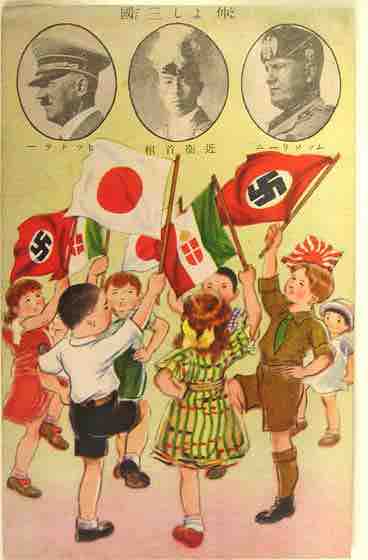The Tripartite Pact
The Tripartite Pact, also known as the Three-Power Pact, Axis Pact, Three-way Pact, or Tripartite Treaty, was a pact signed in Berlin, Germany on September 27, 1940, which established the Axis Powers of World War II. The pact was signed by Germany, Italy, and Japan.
The three nations agreed that for the next 10 years they would "stand by and co-operate with one another in...their prime purpose to establish and maintain a new order of things...to promote the mutual prosperity and welfare of the peoples concerned. " They recognized each other's spheres of interest and undertook "to assist one another with all political, economic and military means when one of the three contracting powers is attacked" by a country not already involved in the war, excluding the Soviet Union.
The pact supplemented the Anti-Comintern Pact of 1936 and helped heal the rift that had developed between Japan and Germany following the 1939 Molotov-Ribbentrop Pact between Germany and the Soviet Union.
The Tripartite Pact was subsequently joined by Hungary (November 20, 1940), Romania (November 23, 1940), Slovakia (November 24, 1940), Bulgaria (March 1, 1941, prior to the arrival of German troops), Yugoslavia (March 25, 1941), and Croatia (June 15, 1941). Thus, this formalization of the Axis powers, and the addition of new powers, marked a the Axis expansion.
The Expanding War: Seizures by Germany, Italy, and Japan
In the years immediately preceding the U.S. joining World War II, the Axis powers expanded geographically, occupying territories.
Germany's Gains in Western Europe
After the annexations of Austria in 1938 and Czechoslovakia in 1939, Germany invaded Poland, followed by Denmark and Norway. In May of 1940, Germany pushed east, occupying France, Belgium, the Netherlands, and Luxembourg. The Netherlands and Belgium were overrun using blitzkrieg tactics in a few days and weeks, respectively. On June 10, Italy also invaded France, declaring war on both France and the United Kingdom; 12 days later, France surrendered and was soon divided into German and Italian occupation zones, and an unoccupied rump state under the Vichy Regime.
With France neutralized, Germany began an air campaign (the Battle of Britain) to prepare to invade Britain. The campaign failed, and the invasion plans were canceled by September.
Italy's Gains in the Mediterranean
During this time, Italy also aggressively sought to expand and occupy more territory. In 1935–1936, Italy overtook Ethiopia. Italy seized Malta in June of 1940, conquered British Somaliland in August, and made an incursion into British-held Egypt in September. In December 1940, British forces began counter-offensives against Italian forces in Egypt and Italian East Africa. The Germans soon intervened to assist Italy, and Hitler sent German forces to Libya in February–March, 1941. In less than a month, British forces were pushed back into Egypt.
Germany's Gains in Eastern Europe
In early April 1941, following Bulgaria's signing of the Tripartite Pact, the Germans intervened in the Balkans by invading Greece and Yugoslavia following a coup; here too they made rapid progress, eventually forcing the Allies to evacuate after Germany conquered the Greek island of Crete by the end of May. (Italy had attempted to invade Greece in October, 1940, but had been repulsed).
Japan's Gains in the Pacific
While Japan sought to expand as well, the war between Japan and China was stalemated by 1940. However, in order to increase pressure on China by blocking supply routes, and to better position Japanese forces in the event of a war with the western powers, Japan seized southern Indochina.

"Good friends in three countries"
A Japanese propaganda poster promoting the Tripartite Pact between Japan, Germany, and Italy.